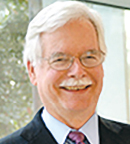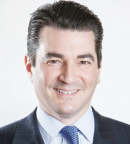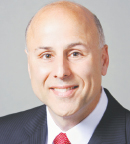
Robert Carlson, MD

Scott Gottlieb, MD
It’s not just the leaps in development of precision medicines, the soaring costs, the new payment models, clinical trial designs, sources of data, and federal policies. It’s all of them plus the rapidity with which change is happening that makes this era of oncology exceptional. “I would say unprecedented,” said Robert Carlson, MD, Chief Executive Officer of the National Comprehensive Cancer Network® (NCCN®), in an interview. “The tempo of change is extraordinary, nothing is static, and things are changing in complicated and important ways.”
To share perspectives on this evolving landscape and its implications for cancer care, the NCCN convened an oncology policy summit with clinicians, patient advocates, and representatives from government and industry. “Policy Strategies for the ‘New Normal’ in Health Care to Ensure Access to High Quality Cancer Care” included an opening keynote address by the U.S. Food and Drug Administration (FDA) Commissioner Scott Gottlieb, MD, and a closing discussion by two congressmen, Mark DeSaulnier (D-CA) and Ted Poe (R-TX), cancer survivors and Co-Chairs of the Congressional Cancer Survivors Caucus. In between, speakers and panelists explored how policy and practice need to evolve to provide every patient access to high-quality cancer care.
Accelerating Access to Innovation
In his opening address, Dr. Gottlieb highlighted areas in which the FDA has adapted to—and helped to create—the “new normal.” They include new clinical trial designs, the use of surrogate endpoints, and other steps, he said, “to modernize the clinical trial process and make sure the development programs are well suited to evaluate the more targeted therapies that increasingly form the backbone of cancer care.” He added that the agency would soon publish a list of surrogate endpoints that are the primary basis of approval or licensure for both accelerated and traditional approvals.
Another FDA priority is the gathering of real-world data. “Leveraging reliable postmarketing data, including real-world evidence, is a key to the new regulatory approaches,” said Dr. Gottlieb. “Right now, a lot of this data remains in silos controlled by the payers. It’s sold at high prices…. I hope we can find new ways to partner with the payer community and share some of their data to answer these questions.”
Paying for Innovation
One of the most visible issues of the “new normal” is the high cost of cutting-edge therapies. Panelists, including representatives from cancer centers, industry, and advocacy groups, shared perspectives on the cost of care. It was noted that large cancer centers have financial navigators on staff to help patients manage costs, and that this is increasingly true in smaller practices as well. “Even in our community practice, we have several people who do nothing but work on patient finances,” said Pavan Reddy, MD, of the Cancer Center of Kansas. Pharmaceutical companies often have patient assistance programs associated with specific high-cost drugs, pointed out Michael Ybarra, MD, an emergency physician and Senior Director of Alliance Development at the Pharmaceutical Research and Manufacturers of America.
Even in our community practice, we have several people who do nothing but work on patient finances.— Pavan Reddy, MD
Tweet this quote
This is also an area where advocacy groups offer detailed information and guidance via helplines and materials. In a second panel on the evolving health-care landscape, Meghan Gutierrez, Chief Executive Officer of the Lymphoma Research Foundation, said that most of the Foundation’s calls from patients are about the cost of cancer care. That’s also true for the Cancer Support Community, said panelist Elizabeth Franklin, Executive Director of the Cancer Support Community’s Cancer Policy Institute. The Cancer Support Community’s helpline offers callers the opportunity to speak with a financial navigator among other information specialists and professionals such as social workers and nurses.
How to choose an insurance plan is one of the questions that financial navigators find themselves addressing. In an interview, Ms. Franklin said that in a 2016 Cancer Support Community survey, about 85% of respondents reported the cost of insurance was either a very important or moderately important factor in their choice of plans. About 10% of respondents said they had a poor understanding of their policies, and those with the least understanding were more likely to feel they did not receive the care they needed. The Cancer Support Community has developed a Cancer Insurance Checklist to help patients living with cancer or at risk for cancer to compare plans when shopping for insurance.
Stephanie Farnia, Director of Health Policy and Strategic Relations of the American Society of Blood and Marrow Transplantation, stressed the importance of reimbursement planning. Citing recent experience with chimeric antigen receptor T-cell therapy, she said the Medicare inpatient reimbursement system, in its current form, is not set up well to deal with leaps in technology and associated high prices. “Treatments that launch without a complete reimbursement and coding plan,” she said, “will face a lag in uptake by providers.”
Narrow Networks and Access to Care
Another window on health insurance issues for patients with cancer comes from experience with the health insurance marketplaces established by the Affordable Care Act (ACA). Many plans offered on the ACA exchanges have narrow networks, ie, they reimburse for care only by designated in-network physicians. Some narrow-network ACA plans do not include major cancer centers.
NCCN ONCOLOGY POLICY SUMMIT
- What: “Policy Strategies for the ‘New Normal’ in Health Care to Ensure Access to High Quality Cancer Care:
- Where: National Press Club, Washington, DC
- When: June 25, 2018
- Up Next: “Policy Challenges and Opportunities to Address Changing Paradigms in Cancer Care Delivery,” September 13, 2018, Washington, DC
In surveys conducted by Avalere Health on behalf of the NCCN in 2017 and 2018, most respondents said their center was in network for some, but not all, ACA plans. The top two reasons for out-of-network status were opting out due to low reimbursement rates and exclusion despite an attempt to join. The surveys showed an increase from 2017 to 2018 in the number of centers being in network for fewer exchange plans than expected (26% in 2018, 15% in 2017).
The NCCN’s Director of Policy and Advocacy, Alyssa Schatz, who presented the survey results, noted that one overall finding was the great variability of the plans. That suggests the importance of knowing what to look for when comparing plans, she said, and therefore the importance of educating patients about choosing insurance. In fact, she noted in an interview, the importance of transparency of information and education in navigating cancer care options was a recurring theme of the meeting.
Responsibility to Educate
Speakers and panelists spoke of education not only for choosing insurance plans, but also for finding clinical trials, learning about novel therapies, and making decisions about treatment options aligned with patient values. “Empowered, knowledgeable patients and families are our best defense against shoddy cancer care,” said Joseph Alvarnas, MD, of the City of Hope Comprehensive Cancer Center, a member of the panel on access to quality care. “We have a responsibility to educate patients and families who are in search of high-quality care as to what constitutes true quality in relation to their cancer journey.”
The current speed of discovery and innovation challenges both providers and patients, said panelist Stephanie Joho, a young colon cancer survivor with Lynch syndrome. Now a patient advocate and consultant, Ms. Joho was treated successfully with an innovative therapy on a clinical trial (discovered by her little sister using cancer.gov), after all other options had failed. She emphasized the importance of continuing education on cutting-edge therapies for both clinicians and patients. (For more on Stephanie Joho’s cancer journey, see the April 10, 2018, issue of The ASCO Post.)
We have a responsibility to educate patients and families who are in search of high-quality care as to what constitutes true quality in relation to their cancer journey.— Joseph Alvarnas, MD
Tweet this quote
Ms. Gutierrez agreed. “Patients and physicians have to become aware of the most appropriate clinical trials; they need ways to communicate and participate in shared decision-making,” she said. In response to this need, advocacy groups have developed educational materials, such as the Cancer Support Community’s photo novella Frankly Speaking About Cancer Clinical Trials.
One aspect of changing times in cancer care are political uncertainties. In their closing discussion, Representatives DeSaulnier and Poe discussed the current climate in Washington, agreeing that the importance of health care should make it not just a bipartisan but a nonpartisan issue. The two congressmen are cosponsors of the Cancer Care Planning and Communications Act (H.R. 5160), which would improve doctor-patient communication by enabling doctors to bill Medicare for the time they spend developing comprehensive cancer care plans. The bill is supported by ASCO, the NCCN, and other oncology groups. ■
DISCLOSURE: Drs. Carlson, Reddy, and Alvarnas, Ms. Farnia, and Ms. Gutierrez reported no conflicts of interest.



